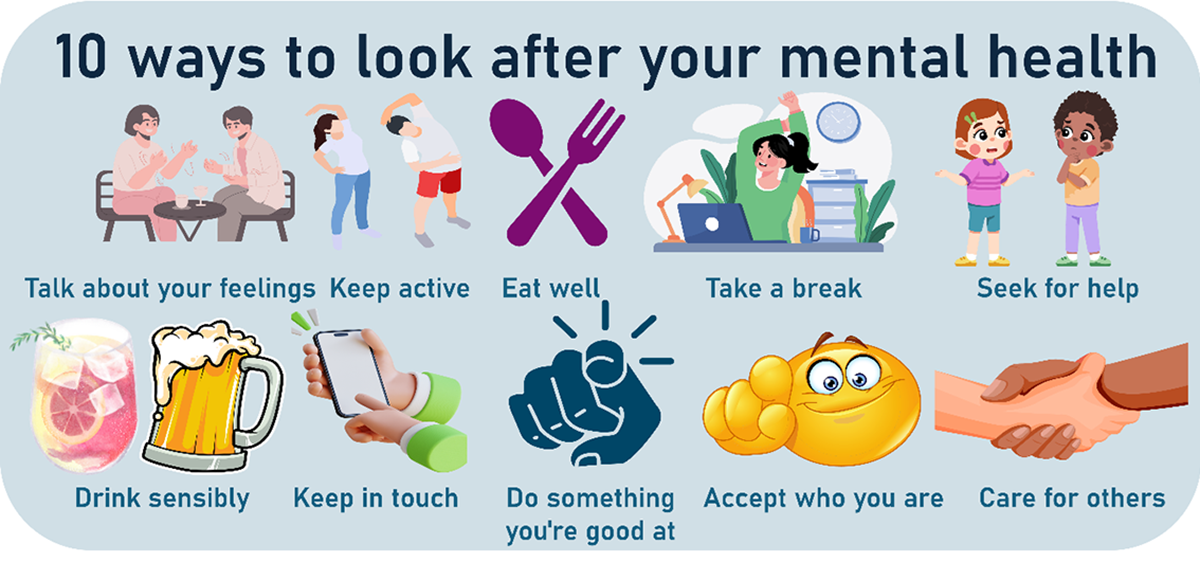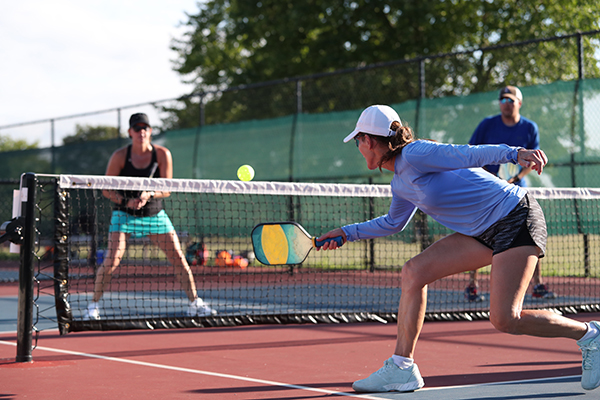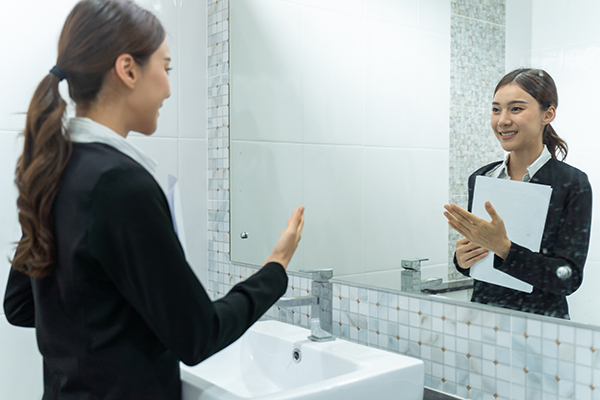With effective strategies, you can conquer stress in graduate school

Apart from the typical academic pressures of graduate studies, the stress associated with meeting academic expectations and balancing your academic and personal life can take a toll on your physical and mental health. To help you manage this stress, this article will talk about developing a few vital skills early on in graduate school as well as keeping yourself healthy, fit, and happy as you progress in your graduate studies.
The graduate school journey is full of adventures! Sometimes you are Alice in your Wonderland, and sometimes Carl Fredrickson sitting in a chair reminiscing about the past. Finding yourself on extreme emotional ends is the reality of graduate school. The cherry of this journey is the difficulty in explaining what you are going through to your near ones. According to the American Psychological Association (2024), the human body has evolved to cope with small doses of stress; however, severe/chronic stress can have serious effects on us. Oswalt and Riddock (2007) found that out of the total student population surveyed, approximately half were stressed and one-fourth were severely stressed.
Apart from the typical academic pressures of graduate studies, the stress associated with meeting academic expectations and balancing your academic and personal life can take a toll on your physical and mental health (Figure 1). There is always the underlying pressure to feel as though you need to improve your resumé through self-motivated actions. On top of everything, loneliness is a big issue, especially for international students.
We are not here to stress you out, but to reassure you that feeling stressed is common and completely normal. By learning and applying effective strategies, you can build the skills to manage and overcome stressful situations. Remember, you are not alone; many students experience the same challenges. Seeking support, practicing self-care, and staying connected with peers can make a real difference in navigating the demands of graduate school (Figure 2).

This article is divided into two sections: The first is about developing, planning, and executing the strategies from the very beginning of graduate school to develop a few vital skills. The second is about keeping yourself healthy, fit, and happy as you progress in your graduate studies.
Start early: Develop these vital skills
1. Prepare a study and research plan
Preparing a study and research plan well ahead gives you ample time to focus on your objectives without getting stressed. Most universities require graduate students to prepare course plans and timelines for research and send those to graduate school. A weekly study and research plan is best for graduate students. Make a list, starting with items that are the highest priority and closest to their deadlines. Some days you may not have specific research work. Invest those days in reading research articles.
2. Make writing a habit in your first year
When you read the biographies of some of the most successful people, it seems they often have one thing in common—consistency. There is a saying that if you work on something for 21 days in a row, it becomes a habit. Whether this is applicable to everyone or not is debatable. However, when you take up a task and perform it daily, starting with a short time investment at first, it leads you to a satisfactory reward, which may come in the form of completion of an assignment, an article for a peer-reviewed journal, or a final piece of a dissertation. First, have your outline ready—work on each section every day. You will be amazed when the task is completed without extra pressure. You can join writing workshops (virtual or in person) or journal clubs to improve your writing skills.
3. Build strong connections through networking

As a graduate student, you are probably aware that networking is tremendously important not just during your graduate school tenure but beyond. But it is easier said than done when we have our anxious minds pulling us from building effective professional relationships. But, hey—You have already come out of your comfort zone by enrolling in graduate school! Initially, you may find it awkward to start a conversation, but a simple “Hello, how are you doing?” can break the ice. Saying “yes” to events you are invited to (whenever possible) is a good way to make friends/connections in graduate school.
4. Participate in events, conferences, and grant-writing competitions
It is said that “a good mentor is not born but made.” Participating in events or conferences not only helps build strong connections, but also helps develop leadership skills in you. It is not just about winning competitions. Some grant-writing competitions for graduate students relevant to agronomy, soil science, and crop science include university grants (please refer to your own university/department website) and graduate student grants from SARE for carrying out a research project (SARE invites grant proposals from four regions of the USA, which you can access from the link above). Applying for travel awards such as those offered by ASA, CSSA, and SSSA can be helpful for both meeting financial needs and improving your writing skills.
5. Develop soft skills

Recruiters nowadays look for candidates with interpersonal skills such as building professional relationships, socio-emotional strength, ability to work in a team, and showing leadership skills (Quintans-Júnior et al., 2023). Developing these soft skills takes time just like many other skills. If you practice every day in front of the mirror for a few minutes, you can overcome the fear of public speaking. Volunteering or community service can be a starting point to understand teamwork. Group studies will give you different perspectives and increase your critical-thinking ability. Often a candidate with soft skills tends to stand out in the crowd, showcasing creativity, self-confidence, and a personal brand.
6. Develop technical skills
When it comes to technical skills, data analysis seems to be the most challenging part for most graduate students. You’ve been working hard on your research, but if you’re not sure what to do with your data, things can get a little tricky. Therefore, choose courses that align with your research. Talk to your adviser, seniors, labmates, or even friends. Universities typically list their courses on their websites. Apart from taking a few statistical courses, you can gain knowledge through relevant webinars, YouTube videos, and articles. Joining a coding club (Example: OSU Code Club) can help you learn the basics of data analysis. Some universities provide data analysis consultancy services to their graduate students through their statistics departments (Example: https://stat.osu.edu/scs).
7. Define your goal and develop a plan to achieve it
Have you defined your goal for ultimate goal for graduate school? Maybe it is “to graduate—on time—smoothly.” Awesome! Once you clearly define your goal, you need a plan to achieve it. Set small, realistic goals to achieve the bigger goal with a tentative timeline (Please refer to this site from the University of Minnesota for developing graduate plan). Check if your department has a specific template for developing the plan. Talk to your adviser while preparing your plan.
8. Build a strong working relationship in graduate school

Building strong relationships with advisers, course instructors, and university staff is vital not just to survive graduate school, but also for a strong career later. Take initiatives such as requesting a one-on-one meeting with your adviser, actively participate in class discussions, and have good relationships with the people in your department. Most advisers try to provide a comfortable atmosphere for graduate students to grow. However, if you find yourself in a difficult circumstance beyond your control or are thinking about changing your adviser, maybe you need to reach out to the university resources that are available to you (example: Graduate Student Committee/Department Coordinators).
9. Anxiety management and presentation skills
Feeling anxious before a big meeting, poster session, or oral presentation is completely normal. To handle this anxiety, start by preparing thoroughly and practicing your material multiple times, ideally out loud or in front of a peer. Visualize yourself presenting confidently and handling questions with ease. Use slow, deep breaths to calm your nerves, and focus on communicating your message rather than worrying about being judged. Arrive early to familiarize yourself with space, have key notes handy (if that works for you), and remind yourself through positive self-talk that it’s okay to feel nervous. Treat the presentation as a conversation with your audience, make eye contact, smile, and engage naturally.
Take care of yourself!
1. Your health is your priority

Juggling between many deadlines, we often tend to overlook our well-being. If you’re not getting sound sleep, you may be like a phantom walking around campus with drowsy eyes and wobbly footsteps. Try to incorporate yellow fruits, green leafy vegetables, berries (rich in antioxidants and vitamin C), protein, and healthy fat in your daily diet along with carbohydrates. The best way to maintain what to eat is to have a diet chart and designate a specific time for cooking (maybe batch cooking of two hours to make two to three days’ worth of food). Staying hydrated is extremely important. Half an hour of a daily walk, yoga, or meditation can positively impact on your health. There are free resources in the majority of universities for students to use such as a gym, fitness center, or bike trail.
2. Breaks between screen times
In this digital era when everything is online, it is hardly possible for graduate students to avoid screen time. Reading articles, replying to emails, submitting assignments, taking exams, preparing for your next career, and many more activities demand long screen hours. Since eyes are directly connected to brain cells, long screen time may impact our concentration level, memory capacity, sleep cycle, and ultimately your mental health. The American Academy of Ophthalmology recommends following 20-20-20 rule: every 20 minutes for at least 20 seconds look at an object at least 20 ft away (Vimont, 2021).
3. Engage in creative works

Have you ever thought about how happy you felt as a kid after finishing a drawing of a house? Or how proud you were of that “masterpiece” sports day speech at school? Graduate school tends to complicate things with expectations coming from everyone—including yourself. So why not hit reset and bring back the little joys you once loved? Whether it’s painting, writing, cooking, singing, dancing, or even knitting, giving just an hour a week to something creative can leave you feeling refreshed and more energized. Life will start to feel a lot less routine and a whole lot more colorful!
4. Put yourself first
While at graduate school you may have to push yourself to build strong relationships, which should not happen at the cost of sacrificing your values/goals. As a graduate student, you need to understand that having a publicly pleasing personality all the time may not actually be helpful in the long run. Sometimes you need to stand for yourself and put your constructive ideas first. Saying “no” doesn’t make you a bad scholar; it simply means you know what you want to do eventually. Have a clearer picture of your life, and work accordingly. Above all: BE KIND TO YOURSELF.
5. Celebrate your achievements
Don’t wait for your graduation day to celebrate. Appreciating your small achievements will motivate you to work further. It can be a happy semester ending, finishing your first article writing, getting done with your sample measurements or data analysis. Maybe you were the only person working late at night in the lab to get your measurements done. Keep a list of your achievements. Celebrate with a dark chocolate bar or a walk in a garden (or whatever appeals to you!). You can also invite others into your celebration through your online professional presence (e.g., LinkedIn, Twitter/X, etc.). Write a small post about your achievement.
6. Talk to your family and friends

Most graduate students move to another state or even another country to pursue higher studies. The situation gets difficult when you do not have any of your close people physically present with you and live in different time zones. Yet, talking to your family and friends will help you to some extent, and who knows, a chat for an hour may make you feel like Anna of Arendelle on a mission who never gives up! Provide your near ones your course timetable, or brief them about your availability. Keep the time fixed for making a video call or just a phone call. And since you probably have less time for phone calls after a hectic day, make a plan about reconnecting with your old buddies.
Remember, you are not alone on this journey. You need time for people to observe your potential. So, work on developing strategies and improve your skills.
| Section | Tip/strategy | Key points |
|---|---|---|
| Start early | Plan and prioritize | Prepare study/research plan, use weekly schedules, focus on deadlines. |
| Make writing a habit | Write daily, start small, join workshops or journal clubs. | |
| Network and connect | Attend events, meet peers, build professional relationships. | |
| Participation in events and competitions | Gain leadership, improve skills, apply for grants/travel awards. | |
| Develop skills | Soft skills: teamwork, communication, leadership; Technical skills: data analysis, coding. | |
| Set goals & plan career | Define short- and long-term goals, discuss with advisor. | |
| Take care of yourself | Prioritize health | Balanced diet, exercise, sleep, hydration. |
| Manage screen time | Follow 20-20-20 rule to reduce eye strain. | |
| Engage creatively | Dedicate time to hobbies for refreshment. | |
| Put yourself first | Set boundaries, stay true to values, practice self-kindness. | |
| Celebrate achievements | Recognize small wins, reward yourself, share progress. | |
| Stay connected | Talk to family/friends, maintain support network. |
American Psychological Association. (2024). Stress effects on the body. https://www.apa.org/topics/stress/body
Oswalt, S., & Riddock, C. (2007). What to do about being overwhelmed: Graduate students, stress and university services. The College of Student Affairs Journal, 27(1), 24-44. https://files.eric.ed.gov/fulltext/EJ899402.pdf
Quintans-Júnior, L.J., Correia, D., & Martins-Filho, P.R. (2023). The rising significance of soft skills in postgraduate education: Nurturing well-rounded professionals for the modern world. Journal of the Brazilian Society of Tropical Medicine, 56, e02452023. https://doi.org/10.1590/0037-8682-0245-2023
Vimont, C. (2021). Are blue light-blocking glasses worth it? https://www.aao.org/eye-health/tips-prevention/are-computer-glasses-worth-it
Graduate Student Committee: Connect with us!
This article is a contribution of the ASA, CSSA, and SSSA Graduate Student Committee. If you would like to provide feedback to this committee on its work or want to volunteer with the committee to help plan any of its activities or write articles like this one, please reach out to Jessica Bezerra de Oliveira, the 2025 Chair of the committee!
If you would like to stay up to date with our committee, learn more about our work, contribute to one of our CSA News articles or suggest activities you would like us to promote, watch your emails, connect with us on X or visit: agronomy.org/membership/committees/view/ACS238/members, crops.org/membership/committees/view/ACS238/members, or soils.org/membership/committees/view/ACS238/members.
Text © . The authors. CC BY-NC-ND 4.0. Except where otherwise noted, images are subject to copyright. Any reuse without express permission from the copyright owner is prohibited.











